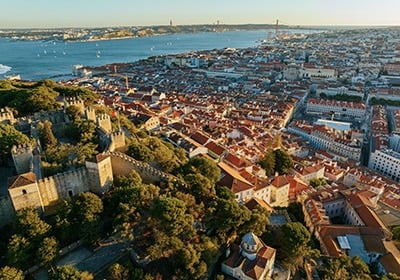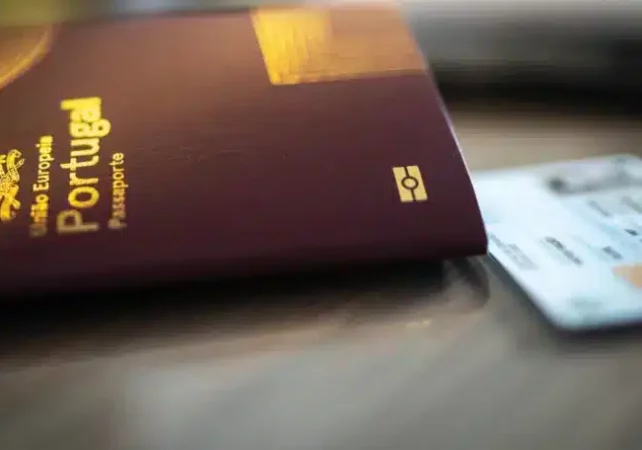Updated: September 26, 2025
Buying property in Lisbon, Portugal, offers a variety of real estate options, from apartments under €600,000, luxury properties with stunning views, to villas near the Lisbon Coast. Property investors often choose Lisbon for its good rental yield, rich cultural history, and stable economy. Residential and commercial properties come at higher prices in tourist hotspots such as Alfama, Baixa, Chiado, and Bairro Alto, while they tend to be more affordable in neighborhoods like Arroios, Campolide, and Marvila.
Many foreigners can freely buy property in Lisbon to diversify their investments. In fact, foreign real estate brings significant contributions to Portugal’s economy, which in turn, creates jobs. Whether you are looking to buy residential or commercial property in the Portuguese capital, you are in the right place. This guide provides key insights into the real estate market, tips, and strategic advice.
Stick around to read about:
- Why buy property in Lisbon?
- Where to Buy Property in Lisbon
- Living in Lisbon City Center vs in the Outskirts of Lisbon
- Property Types in Lisbon
- How to Find Property in Lisbon, Portugal
- Required Documents to Buy Property in Lisbon
- A Step-by-Step Guide to Buying Property in Lisbon, Portugal
- The Costs of Buying Property in Lisbon
Key Aspects of Buying Property in Lisbon
- Lisbon is a strong investment location in 2025, with a high quality of life and rental yields of 6.8 percent (Greater Lisbon).
- Property prices currently stand at €6,934 per square meter in Lisbon, while in the Greater Lisbon Area, prices are €4,935.
- There are no restrictions on foreign buyers purchasing property in Lisbon, but will need to obtain a NIF (tax number)
- The purchase process is largely straightforward, particularly with real estate assistance.
- Lisbon offers a wide range of property types, including modern apartments and spacious houses with views of the Tagus River.
- Property purchase tax in Portugal ranges from 0 to 8 percent usually and will depend on property type, location, and intended use.
Why buy property in Lisbon?
Lisbon is a hotspot for expats and tourists, driving real estate prices to skyrocket. The city offers a strong average rental yield, convenient property taxes, and a high quality of life. Here is a list of the advantages that make Lisbon a good investment.
 Diverse property options: From modern Lisbon apartments to waterfront properties and villas on the Portuguese Riviera, there are many different property options to consider.
Diverse property options: From modern Lisbon apartments to waterfront properties and villas on the Portuguese Riviera, there are many different property options to consider.- Quality of life: Lisbon has a stunning climate, close proximity to beautiful beaches, and a high quality of life, alongside excellent infrastructure and transport links.
- Booming tech hub: Since Web Summit‘s relocation in 2016, Lisbon has become a highly sought-after tech hub, drawing international companies and startups. It has been coined as Europe’s Silicon Valley.
- Competitive value: While property prices are increasing, Lisbon real estate offers better property value with lower prices compared to other European capitals, like Paris and Berlin.
- High rental yields: Ranked 6th most profitable city for real estate by Euronews in 2024, with average rental yields for the Greater Lisbon Area of 6.8, according to the real estate databank Confidencial Imobiliário.
- Safety: Portugal is the seventh safest country according to the 2025 Global Peace Index (GPI), with Lisbon pinpointed as being very safe, particularly for a capital city.
- Municipal Property Tax (IMI): This is the main annual property tax. Each municipality sets the rates for urban properties, including most residential buildings, from 0.3 to 0.45 percent. For example, Lisbon often has the lowest rate of 0.3 percent, while rural properties have a fixed rate of 0.8 percent.
Can foreigners buy property in Lisbon?
If you’re wondering, “Can foreigners buy property in Portugal?”, then, yes, foreigners buying property in Lisbon, Portugal, will face no restrictions. Lisbon is a popular expat destination and offers visitors and residents alike a high quality of life. This fosters a great environment for potential returns on investment, whether you are in search of a property in Portugal for residence or investment.
However, it’s important to understand the market, fluctuating property prices, and potential pitfalls. Buying property in Lisbon is also relatively easy to do if you have the support of a local real estate agent guiding you every step of the way.
Where to Buy Property in Lisbon
 Lisbon is one of Western Europe’s most dynamic real estate markets. While residential property prices have risen sharply in recent years—just like in much of Europe—the city’s vibrant lifestyle, historic charm, and diverse property options continue to attract both property investors and expats.
Lisbon is one of Western Europe’s most dynamic real estate markets. While residential property prices have risen sharply in recent years—just like in much of Europe—the city’s vibrant lifestyle, historic charm, and diverse property options continue to attract both property investors and expats.
If you want to be in the heart of the city, surrounded by cafes, shops, and nightlife, consider central neighborhoods like Baixa, Chiado, and Bairro Alto.
Areas with cheaper real estate prices include Benfica, Olivais, and Beato. You may also want to consider a more affordable area in Lisbon, such as Lisbon South Bay, where there is strong potential to unlock lucrative returns on rental income in the coming years if you enter the rental market.
If you are considering settling in a quieter area, Estrela may be a better choice. This Lisbon neighborhood is great for raising a family while living near different amenities. If you are looking to be in a vibrant and multicultural neighborhood, consider Arroios. For historic neighborhoods, Alfama and Graça are great options. Historic neighborhoods offer traditional architecture and a sense of old Lisbon.
Parque das Nações is a modern area near the Lisbon coast. It features contemporary architecture and a riverside promenade, similar to London’s Canary Wharf. And, of course, Misericórdia offers luxury properties for upscale living, with Avenida da Liberdade, Marvila, Príncipe Real, and parts of Chiado each offering their unique ambiance.
Real estate investment in Cascais is also desirable and is just a 30-minute drive from Lisbon city center. This coastal town combines beaches, high-end living, and strong appeal for property investment.
When it comes to commercial property, while the city center is a leading destination for investing in Lisbon real estate, you can also find affordable places like Marvila and Beato with developed industrial areas that are good for business. A property finder in Portugal can research the local listings and find a neighborhood that suits your needs.
Living in Lisbon City Center vs in the Outskirts of Lisbon
 Property prices in Lisbon’s city center have become increasingly expensive in recent years, despite remaining competitive with prices in other Western European cities. However, people are increasingly looking to find better property deals away from the center, where you will also come across more spacious properties and up-and-coming areas that could prove to be very profitable for investors in the coming years.
Property prices in Lisbon’s city center have become increasingly expensive in recent years, despite remaining competitive with prices in other Western European cities. However, people are increasingly looking to find better property deals away from the center, where you will also come across more spacious properties and up-and-coming areas that could prove to be very profitable for investors in the coming years.
More affordable areas include neighborhoods such as Beato, Benfica, Campolide, and Marvila. Marvila, in the east of the city, is undergoing a huge transformation, for example, with €3 billion being invested into the district, one of Lisbon’s most ambitious revival projects to date.
A Marvila real estate investment right now could be an excellent financial investment and strategic move. The one disadvantage is obviously the distance from the center, but with improved transport links, it’s very manageable. Plus, you’ll find a quieter lifestyle, filled with local restaurants and cafés where you can get to know the owners and build closer relationships.
Property Types in Lisbon
The property market in Lisbon is dynamic and varied. You’ll find an array of spectacular property types in Lisbon leading up the Portuguese Riviera towards Cascais. From modern apartments with stunning views of the Tagus River to spacious villas and mansions, you’ll find the depth of the Lisbon real estate investment market to be extraordinary. If you are considering buying an apartment in Lisbon, think about how many bedrooms you’d like your dream property to have, as this will help you refine your search.
Whether you are looking to be close to the picturesque city center or prefer a country house a short drive from the city, there are plenty of options on the table. You will want to visit Lisbon and explore the different neighborhoods to ensure you choose the perfect property and the ideal part of the city for you.
How to Find Property in Lisbon, Portugal
- Define your goals: Determine if you are looking for an investment property, a second home, a vacation property, or are looking to relocate permanently. This will help you kickstart your research.
- Research: A good place to start is with online research, which will give you insight into the types of property available for rent or purchase and an idea of the price of property in the city. A quick property search for “buying house in Lisbon” or “buying apartment in Lisbon” will get you off to a good start.
- Seek expert help: Seeking the professional assistance of a real estate agent or a buyer’s agent will make your property search much easier, as you can benefit from their expertise and local knowledge. A buyer’s agent, such as Goldcrest, will usually have access to properties for sale that cannot be found elsewhere. Buyer’s agents can sometimes find Lisbon property at a slightly cheaper price.
How to find a reliable real estate agent in Lisbon?
Find a reliable real estate agent in Lisbon by checking licensing, verifying reviews on trusted sites, and seeking referrals from locals or expats. Meet at least three agents to compare their fees, experience, and communication style. Prioritize agents with a positive track record in the Lisbon neighborhoods you are trying to target.
A Lisbon real estate agent will be helpful to find properties in Portugal, but it’s essential to know that they will work on behalf of the seller, whereas a buyer’s agent, such as Goldcrest will work on behalf of the buyer and work alongside you from sourcing properties through to acquisition and beyond, simplifying the entire process. They can improve your chances of finding the dream property at the best possible price.
Required Documents to Buy Property in Lisbon
 Before you begin the process of buying property in Lisbon, Portugal, it is important to have all the essential documents ready to ensure the property purchase journey is seamless and legally compliant with the Portuguese property market and real estate laws.
Before you begin the process of buying property in Lisbon, Portugal, it is important to have all the essential documents ready to ensure the property purchase journey is seamless and legally compliant with the Portuguese property market and real estate laws.
To buy property in Lisbon, you will need the following documents:
- Photo ID: A valid passport or identification document that verifies your identity.
- Contrato Promessa de Compra e Venda (CPCV) or Promissory Agreement and Property Deed: The promissory contract outlines the terms and conditions of the property purchase. This is a common first step, requiring a down payment. It’s best to ensure you do proper due diligence before this step to avoid potential issues like bankruptcies or the seller disappearing before the deal is finalized. The final step is signing the property deed, which must be done in the presence of a Notary.
- Energy Certificate: The property’s energy certificate is a document that provides information about the energy efficiency of the property and must be presented to you by the seller.
- Imposto de Selo: The stamp duty payment, which is a tax required by the Tax Authority (Finanças) for property transactions.
- Caderneta Predial: The land register document that contains information about the property, including its location, boundaries, and registered owner.
Working with a real estate lawyer in Lisbon can be invaluable. They can assist you with obtaining the necessary documents and completing due diligence checks on the property on your behalf.
A Step-by-Step Guide to Buying Property in Lisbon, Portugal
Buying property in Lisbon, Portugal, comes in multiple steps. You secure your finances for the property you plan to buy, make your offer, and sign the documents. The table below can walk you through the steps from start to finish, including the legal requirements you may face when compiling the paperwork.
Step | Description | |
Step 1: Secure financing for your property | Assess your finances, explore mortgage options from Portuguese banks, and understand associated costs such as taxes, legal fees, and property registration expenses. | |
Step 2: Find the perfect property | Set a budget and research the Portuguese real estate market, focusing on location, amenities, and rental potential. Seek guidance from real estate professionals like buyer's agents or real estate agents. | |
Step 3: Make an offer | Once you find a suitable property, negotiate an offer with the seller, potentially facilitated by a real estate professional. Consider having a buyer's agent representing your best interests during negotiations. | |
Step 4: Reservation Agreement and CPCV | After an offer is accepted, a Reservation Agreement may require a refundable fee. The Promissory Contract (CPCV) formalizes the promise of acquiring real estate between parties at a future date under pre-defined conditions and includes a deposit to secure the transaction. We recommend that the signing of the CPCV is done in front of a Notary. | |
Step 5: Signing the Escritura | The Escritura, or Final Deed, officially transfers property ownership. Signed before a Notary, it involves paying remaining balances and fees. After signing, the buyer becomes the official owner, concluding the process. | |
Exploring Taxes and Fees when Buying Property in Lisbon
Expats and locals both will need to pay taxes when purchasing property in Portugal, alongside additional costs.
 At the time of purchase
At the time of purchase
Below are the property taxes that you will need to consider when buying property in Portugal at the time of purchase.
Property purchase tax (IMT)
The (IMT) Imposto Municipal Sobre as Transmissões Onerosas de Imóveis (Municipal Tax on Onerous Transmissions of Real Estate) is a property transfer tax paid when purchasing Portuguese property.
The tax rate for this property purchase tax ranges from 0 to 10 percent and is applied to the property’s purchase price. The 0 to 8 percent range depends on factors such as the price, location, property type, and intended use of the property, for example, whether it will serve as a permanent residence or secondary housing. The 10 percent rate applies if the buyer has connections to territories with favorable taxation schemes, also known as blacklisted jurisdictions.
Stamp duty
Imposto do Selo (Stamp Tax) is an additional transaction tax that may need to be paid. Lisbon real estate transactions are usually subject to a rate of 0.8 percent.
 Taxes after the property purchase
Taxes after the property purchase
Below are the property taxes that you will need to bear in mind on an annual basis when buying real estate in Lisbon.
Municipal Property Tax (IMI)
The (IMI) Imposto Municipal sobre Imóveis (Municipal Property Tax or Immovable Property Tax) is an annual tax established annually by the municipality and is determined by the area in which your property is located. The amount is usually between 0.3 and 0.45 percent for urban properties (which can go up to 0.5 percent in certain situations) and 0.8 percent for rural properties. Note that the IMI is levied on the tax value of the property and not on the price paid for the property.
Additional to IMI (AIMI)
AIMI is a tax that you will need to pay if your property is valued at over €600,000. This will range from 0.7 to 1.5 percent, depending on the price.
A 0.7 percent tax applies to property valued between €600,001 and €1 million, a 1 percent tax on property valued between €1 million and €2 million, and a 1.5 percent tax on property valued above €2 million.
The €600,000 threshold is individual. For jointly owned property with a partner, the AIMI only applies if the property’s value exceeds €1.2 million.
Capital Gains Tax
You will be subject to Capital Gains Tax in Portugal when you sell your property. There are exemptions to paying Capital Gains Tax should you choose to reinvest the money you got from the sale back into the Portuguese real estate market.
The Costs of Buying Property in Lisbon
When preparing to purchase property in Lisbon, Portugal, it’s crucial to factor in the various one-off costs essential for the transaction. These include:
- Notary fees: €500 to €1,000
- Legal fees: €2,000 to €5,000 (depending on property type, price, and complexities of the purchase)
- Land use registration: €200 to €250
How to finance a Lisbon property purchase?
To buy property in Portugal, you can finance your home through Portuguese banks offering mortgages to residents and foreigners, usually covering 60 to 80 percent of the price, with terms up to 30 years. Foreign buyers must obtain a Tax Identification Number (NIF) and provide proof of income, credit history, and property valuation to secure approval.
The maximum one can borrow depends on the loan-to-value. For residents with a fiscal number, the maximum one can borrow is 90 percent for a permanent home (80 percent for a second home). For non-residents, the maximum loan-to-value mortgage ratio is 60 to 80 percent.
 Get your budget straight
Get your budget straight
After thoroughly researching property prices, it is important to create a clear budget that takes the additional property costs, from initial application fees to property taxes. Be prepared to make a down payment, typically 10 to 20 percent for Portuguese residents and 30 to 40 percent for non-residents, if financing through a loan or mortgage.
 Finance your property
Finance your property
If you have the capital, you can purchase a property in Lisbon with a once-off payment. However, there is also a great selection of mortgage options from financial service providers, including BBVA, Santander, Banco Best, Bankinter, and Banco CTT. While not always necessary, you’ll need financial documentation and a Portuguese bank account if you plan to get a mortgage in Portugal.
Requirements for Buying Real Estate in Lisbon
An essential part of the process when buying property in Lisbon and Portugal is applying for a Portuguese NIF number and opening a bank account. You will need a Portuguese NIF number to make any significant financial transactions in the country, whether you are considering investing in the Lisbon residential real estate market or acquiring a commercial property.
 Portuguese tax number (NIF)
Portuguese tax number (NIF)
You will need a NIF, the Portuguese Tax Identification Number, to open a bank account in Portugal. You can apply for a NIF number yourself at your local tax office or get an attorney to assist you. If you are a non-EU citizen, you will need to have a fiscal representative. To avoid having to go to the local tax office, you can also apply for your NIF number online.
 Portuguese bank account
Portuguese bank account
When buying property in Lisbon Portugal, it is recommended to open a Portuguese bank account to avoid transaction fees when making your purchase. There are a variety of Portuguese banks to consider, many of which offer mortgages for foreign buyers.
Visa and Residency Options
 Owning property in Portugal does not automatically grant you residency. If you are purchasing a property for long vacations or to live in permanently, you will need to secure one of the valid visa options Portugal offers.
Owning property in Portugal does not automatically grant you residency. If you are purchasing a property for long vacations or to live in permanently, you will need to secure one of the valid visa options Portugal offers.
The visa options for non-EU citizens looking to become property owners include the Portugal D7 Visa (Retirement or Passive Income Visa), the Digital Nomad Visa (for remote workers), and the Portugal Golden Visa program (for investors).
There is a wide range of residency options available for those buying Lisbon real estate. If you want to discuss your options, feel free to get in touch with our citizenship and residency division, Global Citizen Solutions, who will be more than happy to help you with relocating to Portugal.
Goldcrest: How We Can Help You
Goldcrest is a buyer’s agent that is based in Lisbon. We provide expert, impartial advice on real estate investments and how to buy property in Portugal. From scouting out the perfect property through to property acquisition, we have you covered throughout the process.
If you are looking to purchase property in Portugal, don’t hesitate to get in touch. Our team of skilled experts is available to solve all your real estate doubts, helping you with the property search and offering insightful expertise and strategic advice.
Why choose Goldcrest?
- Local knowledge: With offices located across Portugal, our presence nationwide allows us to assist you personally across the country.
- Independent service: As an independent buying agent, we do not represent any development or project. Our service is entirely tailored toward each individual client, providing you with everything you need to secure the perfect property at the best possible price. As an impartial advisor on the market, we work solely on behalf of our client and provide a service tailored to your needs and requirements.
- Streamlined process: Our real estate agents speak English and Portuguese, and our service is completely focused on providing you with a hassle-free buying experience, saving you time.
- Experienced team: Our expert real estate team has a vast local knowledge of the Portuguese property market. We have cutting-edge technology and metasearch tools at your disposal to provide full market coverage, ensuring the best investment choices and negotiated prices.
- Network of partners: We have a close network of partners, including lawyers, property management services, builders, architects, designers, and landscape gardeners, again saving you time and hassle by providing you with trusted experts in their field of work.
Frequently Asked Questions About Buying Property in Lisbon
Are there any restrictions to buying a house in Lisbon as a foreigner?
There are no restrictions on buying a house in Portugal as a foreigner or on foreign property ownership. However, while there are no restrictions on purchasing property, if you are a non-EU citizen, you will need to have a valid residency permit to live in Portugal.
Where are the best neighborhoods to buy a house in Lisbon, Portugal?
The best neighborhoods in Lisbon to buy a residence include Alcântara and Anjos, which are modern areas that attract digital nomads and young professionals. Areas like Alfama and Graça offer authentic Portuguese charm and living experiences, while areas such as Estrela and Lapa are popular choices for families.
Do I need a lawyer when buying a house in Lisbon?
Although professional assistance is not strictly required to buy property in Lisbon, it is recommended that you acquire the services of an experienced real estate lawyer or a buyer’s agent who has vital knowledge about the city’s real estate market legalities.
Is property in Lisbon expensive?
Property in Portugal’s capital city is highly sought-after and, therefore, it is more expensive to buy a house in Lisbon than in other regions of Portugal. In 2024 in Lisbon, the average asking price for property was €6,934 per square meter, while in the Greater Lisbon Area, it was €4,935.
What is the average price of a property in Lisbon?
In Lisbon, the average asking price for property was €6,934 per square meter in 2024, while in the Greater Lisbon Area, the average asking price was €4,935. Average property prices in Portugal vary depending on the neighborhood and whether you are looking for residential or commercial real estate.
Is now a good time to buy property in Lisbon?
While housing prices are higher, 2025 is a great year for foreign investors to invest in family properties or luxury properties in Lisbon, Portugal. This is due to the significant growth of rental income yields over the past few years. Rental income yields in the Lisbon Metropolitan Area stood at 6.8 percent in 2024.
Is it worth buying property in Lisbon?
Buying property in Lisbon is worth it for investors seeking strong rental yields, steady capital growth, and lifestyle benefits. The city offers convenient property taxes and a stable economy. But, as a buyer, you must consider the rising prices and heavy competition, especially in top tourist destinations, like Baixa, Chiado, Alfama, and Bairro Alto.
Is buying property in Lisbon a good investment?
Lisbon is emerging as a sought-after destination for property investors, with expectations of a 1.8 and 1.9 percent year-on-year GDP growth in 2024, followed by a projected 2.1 to 2.4 percent in 2025.
What documents are needed for buying real estate in Lisbon?
To buy property in Lisbon, you will need:
- Photo ID: Valid identification
- Contrato Promessa de Compra e Venda
- Energy Certificate: Provided by the seller, details the property’s energy efficiency
- Imposto de Selo: Stamp duty payment required by the Tax Authority.
- Caderneta Predial: Land register document with property details.
What is the process for buying a house in Lisbon for non-EU citizens?
Non-EU citizens need a Portuguese tax number (NIF) and a tax representative, and it is recommended to open a Portuguese bank account to save on transaction fees. The process to buy property in Lisbon involves the property search, securing financing, making an offer, signing a promissory contract, and finalizing the sale.
Can Americans buy property in Lisbon?
Yes, Americans can buy property in Lisbon without restrictions. You will need to have a Portuguese tax number (NIF) and appoint a tax representative. It is also advisable to open a Portuguese bank account to minimize transaction fees.
Can foreigners get a mortgage for buying property in Lisbon?
Yes, foreigners can obtain mortgages from Portuguese banks, with more than 15 banks offering financing options to foreign buyers.
Is Airbnb profitable in Lisbon?
Yes, Airbnb can be profitable due to Lisbon being a major tourist destination and high occupancy rates, especially in central areas. Profitability depends on location, property quality, and seasonality. When investing in Airbnb, it’s important to be cautious of the local restrictions, which you can learn more about with our Alojamento Local (AL) guide.
What are the pitfalls of buying property in Lisbon, Portugal?
The downsides of buying property in Lisbon include inflated asking prices in tourist areas and hidden costs for renovations. There is a chance you may encounter unclear property titles, zoning restrictions, and fluctuating rental regulations. A buyer’s agent like Goldcrest can do a thorough due diligence and property management, so you can get the most out of every investment.
